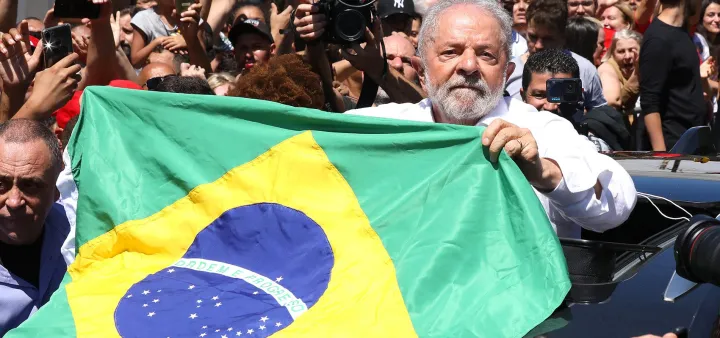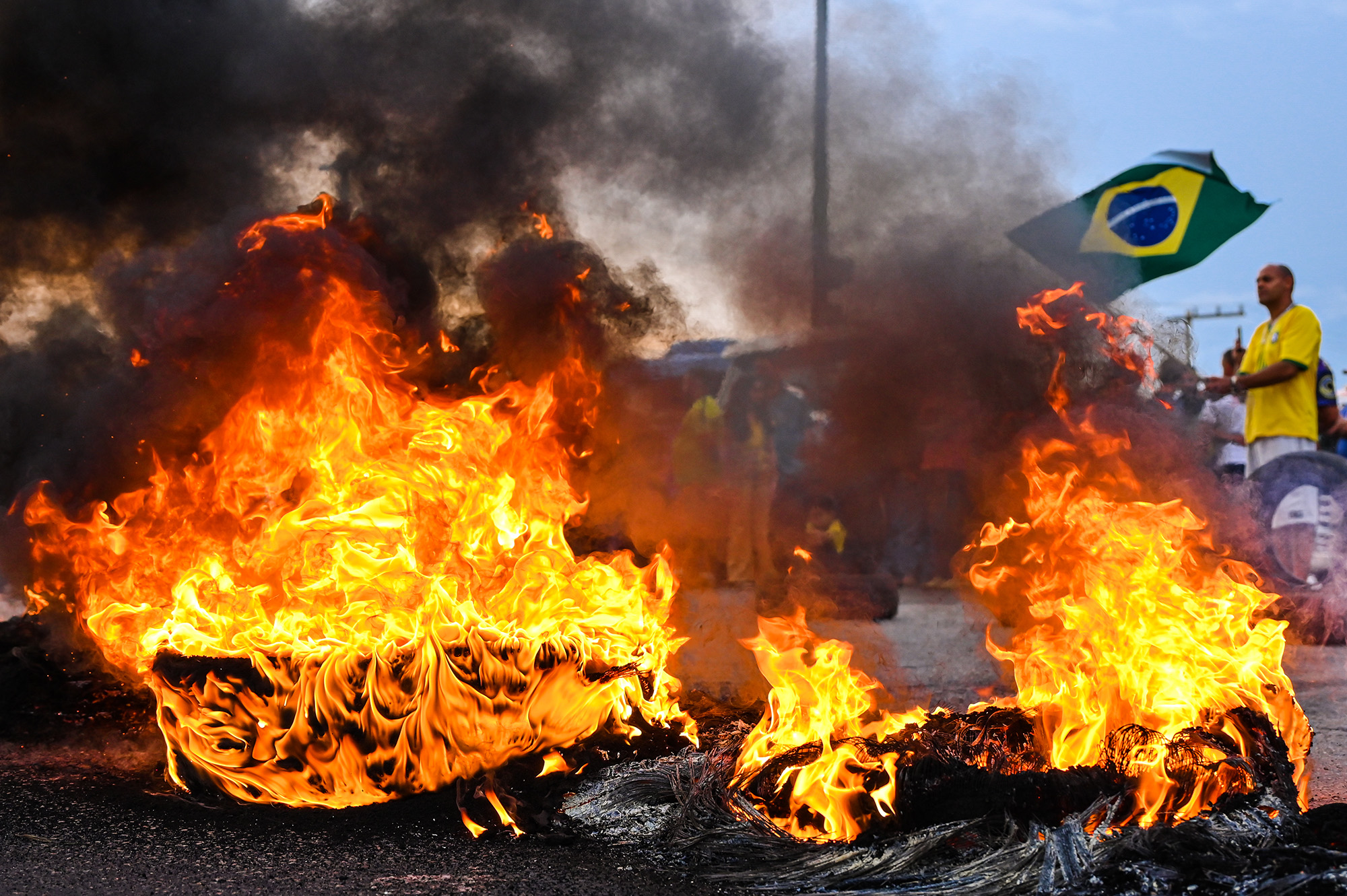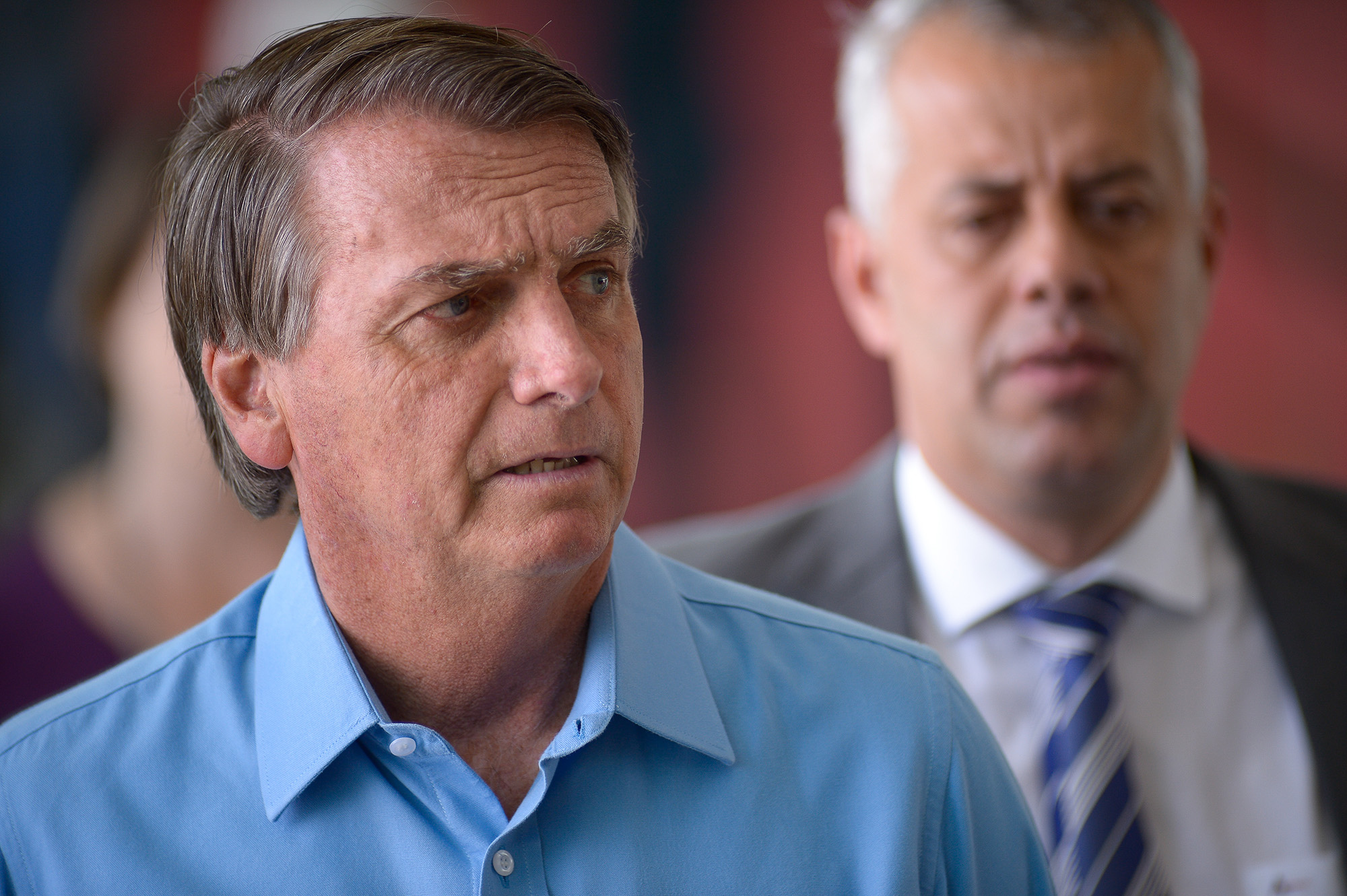BRAZIL-SOUTH AFRICA OP-ED
Don’t believe the RET faction’s hype – Lula is not Zuma

Unlike Jacob Zuma, who has used all mechanisms of the state and legal Stalingrads to avoid prosecution, Luiz Inácio Lula da Silva and his successor, Dilma Rousseff, strengthened the powers of the judiciary and prosecutors to go after corruption, removing many of the legal loopholes used by Brazilian politicians to guarantee impunity.
Luiz Inácio Lula da Silva triumphed in the Brazilian presidential election on Sunday, 30 October 2022, winning by a narrow margin of 50.9% to Jair Bolsonaro’s 49.1%, translating into just more than 2 million votes.
When the result was finally called at about 8pm, the streets of downtown São Paulo exploded in joy, relief and raw emotion.
Tens of thousands of people from all walks of life headed to Avenida Paulista, the megacity’s usual gathering point for political events, crying, singing and dancing.
For those celebrating it was as if the burden of the last four years of unmitigated disasters had been lifted off their shoulders and the Brazil they once knew was back.
By any measure, Lula’s victory over Bolsonaro is one of democracy over authoritarianism, ecological concern over rampant nihilistic capitalism, progress over regression. Let us also not forget those 700,000 Brazilians who died from Covid-19 in what is widely regarded as the worst possible response to the pandemic.
As of writing, Bolsonaro has yet to admit defeat and his most fanatical supporters working with the Federal Highway Police have blockaded roads in the hope of overturning the election result. One of the few signs of life is that Bolsonaro and his wife have apparently unfollowed each other on Instagram.
The good news is that a successful coup is becoming more unlikely by the second: all of Bolsonaro’s most powerful supporters have recognised the election result and it has been widely reported that, at some point in the near future, Bolsonaro will grudgingly admit defeat and the country can move forward and begin working towards a peaceful transition.
I can forgive South Africans for being a little more cynical, after seeing the ANC’s Radical Economic Transformation (RET) crooks celebrating Lula’s victory and attempting to spin it in favour of Jacob Zuma. I also remember the empty spin of “the Lula moment” before Zuma’s second term and I too would like to see those who have looted and betrayed South Africa successfully prosecuted, but Lula is not Zuma and South Africa is not Brazil.
A short history of Brazil
I have spent most of the last decade researching and writing about Brazil. As a South African, I was inspired to begin this journey by the obvious similarities between the two countries: a long history of brutal racism, violent inequality and inspiring histories of resistance against oppression.
There is also – importantly in terms of my actual research about corruption – a truly competitive race in terms of which country’s politics is more absurd.
That said, apart from the obvious points about size, demographics, language and the abilities of our national football teams, there are more than a few significant differences between South Africa and Brazil that are worth pointing out.
Brazil has been an independent country since 1822 – unlike other Latin American nations, its independence stemmed from a rather unusual historical process, the Portuguese monarchy had relocated to Rio de Janeiro to escape Napoleon’s invasion of the Iberian Peninsula.
Even at this stage, Brazil was already more fun, populous and wealthier than its colonial overlords, so a faction of the royal house decided to stay, and Brazil was born as an empire rather than a republic.
I don’t want to bore readers with history, but the point is that Brazil has had over 200 years of independence and is a far older nation than our own.
Since the beginning, Brazilian political history has been characterised by the relative stability and continuity of its ruling class – if one is to examine the names that dominate the nation’s politics over the last 200 years, one keeps on running into the fact that the same oligarchic clans have more or less maintained power over the country. They were later joined by a new generation of industrialists and immigrant political and business entrepreneurs.
Brazilian politics is defined by multiple competing centres of power in terms of region, institutions such as the military and judiciary, and different fractions of capital including agrobusiness, finance and industry.
While these different factions endlessly scheme and plot against each other, whenever Brazil has been faced with a moment of rupture, or revolutionary break, these factions come together and form a compact to modify the system slightly and maintain their power.
This tends to come in the form of a military coup which is subsequently spun in the history books as a “revolution”.
From the establishment of the republic in 1889 to the rise of Getúlio Vargas in 1930 and later the military coup in 1930, Brazil has only known two periods of relatively real democracy in its history – from 1945 to 1964 and 1985 to the present day.
Corruption in Brazil is in some ways a mechanism of maintaining this elite stability; it is by design a means of forming coalitions and ensuring buy-in for different projects from different elite factions.
In Brazil’s New Republic, established in the constitution of 1988, it is virtually impossible – given the regional distribution of seats in Congress – to win a legislative majority, as much of the lower house is populated by bottom-feeding oligarchical parties with misleading names that exist only to rent out their support to the highest bidder.
As such, in order to govern, you need the buy-in of these interests to pass policy, making corruption, as I have argued elsewhere, a mode of rule.
Corruption in Brazil has become part of a competitive multiparty democracy. What I mean by this is that you actually need to sort of deliver the project you are looting from, and the trains do actually run even if they took longer than expected to be built and were significantly more expensive than planned.
Unlike South Africa, corruption in Brazil has tended to increase historically – with the expansion of state capacity rather than undermining it – and this is summed up in the immoral slogan of “rouba mas faz” (he robs but gets things done).
This is not an apologia for corruption, but is rather an analysis of its enduring power – it’s more than simply a matter of bad ethics; it is part of “the system”.

A demonstrator waves a Brazilian flag as truck drivers and supporters of President Jair Bolsonaro block 491 road with a burning barricade to protest against the results of the presidential runoff on 31 October 2022 in Varginha, Brazil. (Photo: Pedro Vilela / Getty Images)
Lula is not Zuma
Lula da Silva’s rise to power represented a break with this system to an extent.
He was the first president from a truly working class origin; a former trade union leader with little formal education who had been able to build the first actual party in terms of identification, programmatic coherence and possessing goals beyond power and trading in rent- and influence-seeking in Brazilian history –the PT (Workers’ Party), the last great mass working class party formed in the 20th century.
After losing election after election, the PT and Lula opted to move towards the centre, accepting macroeconomic orthodoxies and forming alliances with forces across the political spectrum in order to finally take power in 2002.
Lula left power in 2010 as one of the most popular elected leaders in history with an approval rating of 83%, leaving behind a legacy of social inclusion, investment in infrastructure, public education, an increased minimum wage and more than 30 million Brazilians lifted out of poverty.
The Brazil Lula left behind had ended hunger.
Water and services had been delivered for the first time to the poorest regions of the land; deforestation had been pushed back; new universities had been constructed and Brazil seemed on the verge of realising its destiny as the country of the future.
Well, it’s a rather complicated and weird story of what happened to arrive at the point of Jair Bolsonaro being elected, and yes, there were major corruption scandals, morally dubious compromises and failures – particularly in terms of public security – but unlike Jacob Zuma, Lula governed and left behind a country that was significantly better off than when he found it.
Lula did not preside over a nihilistic looting project and growth of a parallel mafia state commanded by an Indian business clan.
While Lula opted to make compromises with financial elites and mafia parties, it was in order to pass moderate but relatively progressive social policies rather than for base material interest.
Of course, one can be critical of the scandals and failures of these years, but there is a demonstrably clear qualitative, moral and empirical difference between Zuma and Lula.
Unlike Zuma, who has been pleading for his day in court for well over a decade and has used all mechanisms of the state and legal Stalingrads to avoid prosecution, Lula and his successor, Dilma Rousseff, strengthened the powers of the judiciary and prosecutors to crack down on corruption, removing many of the legal loopholes used by Brazilian politicians to guarantee impunity.
But, as the irony of history often goes, this would cost them.
Dilma Rousseff was impeached after a series of major corruption scandals and prosecutions conducted by the Lava Jato (carwash) investigation, but she was never charged with any act of corruption and was instead impeached on a technicality related to “creative accounting” in the budget to fund social programmes.
This technicality has since been legalised and surpassed by a truly vast scheme of institutional corruption known as “the secret budget”, which allows the pro-Bolsonaro president of Congress to channel virtually unlimited funds with no oversight to allied members of Congress to buy support.
Lula was convicted of corruption and money laundering related to an apartment supposedly gifted to him by a construction company in a second-rate decaying seaside city. The only problem was that there was no evidence that he had actually lived in the apartment – unlike Nkandla – and despite years of investigation, there was no solid evidence.
So the prosecutor conspired with a power-hungry judge-turned-politician by the name of Sergio Moro to convict Lula.
They broke every standard of judicial independence, and the judge more or less made the case to convict the accused. This led to Lula being disqualified as the candidate in 2018 and jailed. Moro would be rewarded with the position of justice minister in Bolsonaro’s government.
Later, The Intercept Brasil exposed the largest judicial corruption scandal in recent history anywhere: the secret messages exchanged between Moro and prosecutors were now on full display and by no reasonable means could this conviction be upheld – the Supreme Court annulled all of Lula’s convictions and he remains an innocent man.
Unlike Zuma, despite knowing he had been stitched up, Lula went to jail willingly and didn’t try to organise a treasonous uprising against the state to avoid being imprisoned.
Bolsonaro’s disgovernment and RET
Bolsonaro, despite coming to power on an anti-corruption platform, immediately after taking office proceeded to dismantle all accountability mechanisms in Brazil, sealing records for 100 years and placing cronies in key positions in the Attorney-General’s office and the Federal Police, Federal Revenue Service and Federal Highway Police. Does this not sound a little like Zuma?
As noted by Transparency International, Bolsonaro has used the state to avoid prosecution for his and his families’ links to paramilitary mafias, numerous corruption schemes involving phantom employees, buying 51 properties in cash and vast amounts of Covid-related misdeeds, from the mass purchase of Viagra for the military to demanding kickbacks of $1 per dose for vaccines.
Bolsonaro’s governance has been characterised by a deliberate project to undermine state capacity by handing over key oversight mechanisms, including environmental protection agencies, to private actors who have a vested interest in ensuring dysfunction.
While I don’t want to stretch the analogy, there are similarities to our own version of State Capture and the sums we are talking about here number in the billions, dwarfing in scale the scandals of the PT (Workers’ Party) years.
One doesn’t need to be a Lula supporter, or even left wing, to breathe a sigh of relief following the Brazilian election result.
Lula’s victory represents, as I have argued before, a return from the abyss – the return of one of the world’s largest democracies from its four years as a quasi-pariah state and a victory for those who wish to have a Brazil to govern in the future.
It is for this reason that almost all of Brazil’s major leaders from across the political spectrum with any measure of respectability, including noted PT critics, endorsed Lula. They include former President Fernando Henrique Cardoso, centrist MDB (Movement for Brazilian Democracy) candidate Simone Tebet, former Judges Joaquim Barbosa and Celso de Mello, environmentalist Marina Silva and many others.
Lula’s victory is something for South Africans to celebrate – don’t let the opportunism of RET stooges take that away. DM
Benjamin Fogel is a historian and contributing editor at Africa is a Country and Jacobin.





















 Become an Insider
Become an Insider
So interesting, thank you for an excellent overview of the Brazilian political landscape
The world is a sick puppy when one looks at the poor quality of leadership options available in a host of nations and the brewing cess-pool of divisions and ultra-factions. it reads like the run-up preceding WWII. Where are the Roosevelt, Churchill, Lincoln of today? We have an over supply of Hitler, Mussolini, Stalin, Mao and please-everybody do-nothing administrators!
I enjoyed this article immensely. Well written and informative.
Great article – I’ve never stopped to consider Brazil’s history…an Empire before becoming a Republic……very interesting. I wish Lula well and a pox on Zuma ( that can’t be eradicated by having a shower) !!
Brilliant informative article. Thanks Ben
The problem with ANC elements is economic illiteracy and that includes most of the South African journalists. The article fails to put into perspective the economic condition at national and global level that spurred Lula success in the first term including a boom in commodity prices. Those who were shouting about the Lula moment in South Africa, were simply parading their ignorance in public. This is because the South African economy at that time they were making such comments was in the throes of the 2008 financial crisis and was stuttering and Zuma was no Lula by any stretch of imagination but a thief and unmitigated thug. Zuma was not a founder of ANC as Lula was the founder of the Workers Party. Lula never entered into power with intent to steal like Jacob Zuma. The other issue is that Lula has returned to power in a very different national economic and global economic setting with the Brazilian economy in very serious difficulties. More significantly, he returns to power in a very highly divided country and to bring it together is a massive task. His case has no similarities to Zuma as well as the context. Zuma has no leadership qualities and you can only compare him to Cyril in term of non – leadership. Brazil economic and industrial structure despite its economic challenges, is far different from
that of South Africa despite competition for markets in some industries which is very central to my criticism of BRICS.
Great article-thank you. I have visited Brazil several times on work assignments, but have never really come into contact with it’s politics. Rather wild economy (and currency!) yes. Given its relative proximity to South Africa, its size and potential, it is strange that we do not have stronger economic ties.
You would need to look at the IMF figures on GDP, debt to GDP, current account deficit, exports and imports. You would worry about your sugar industry, bananas, broilers or chicken industry and by the way they do a lot of dumping which is nice for them and hell for us. You will have to look at their markets and our markets and tell us what trade relations we can have before you listen to the ANC drivel! You must look at their trade partners and our trade partners. The business that seems to thrive are drugs from Sao Palo. So much for BRICS!
Fantastic article,thank you for this insight.
Great context after the tense horror of the election and the contrived social media propaganda that backed Bolsonazi. Great writing Ben. Obrigada.